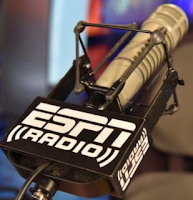Shares of Disney jumped as much as 3 percent Friday after a report said the company was considering a spinoff of its ESPN sports networks, reports The NY Post.
But shares of the Mouse Houses gave back some of their gains, closing the day up only 1.2 percent, after a person familiar with the matter denied the report.
The initial story published by Puck News said Disney CEO Bob Chapek had tapped some of his closest deputies to explore a separation of the sports channels from the rest of the company.
One unnamed source is reported as having told the publication that “there are now conversations happening regularly at Disney about whether or not to spin off ESPN.” But an anonymous person close to the company told CNBC that the story wasn’t accurate.
CNBC anchor Julia Boorstin told viewers that a source “close to the situation” said the report is “inaccurate.” The source said that Disney is “focused on building the value of ESPN+ for its digital bundle, and that it is also pursuing sports betting for ESPN and ESPN+Disney has been vocal about its views on the importance of streaming to the company. When it launched Disney+ in 2019, the company revealed it would offer a bundle that would include sibling streaming services Hulu and ESPN+ — a move that would help it take on streaming giant Netflix. The bundle, which currently costs $13.99 a month with ads is the same price as Netflix’s standard plan.
In order to beef up its movie and TV show offering, Disney reorganized its entertainment operations last year. The move allowed programming divisions, like the film and TV studios, to focus their efforts on feeding the streaming services, not just movie theaters and TV networks. The company has also invested more heavily in ESPN+ recently to pump up its original series and other shows.
But most of Disney’s growth has occurred at Disney+, which has roughly 116 million subscribers, according to the company’s third-quarter earnings report. Hulu notched just under 43 million and ESPN garnered just under 15 million.
For Disney, part of the reason why ESPN’s growth has been so slow is because most of its viewers watch it on TV. In fact, Disney requires pay-TV providers to include ESPN as part of their most popular cable packages, and avid sports fans are paying top dollar.
As consumers continue to gravitate toward direct to consumer, we have the optionality that we need.”
The case for Disney to move ESPN goes like this, according to the Outkick:
Disney’s market capitalization is around $317 billion, which experts say doesn’t capture the extent of Disney’s library and intellectual property. Meanwhile, Disney’s stock sits at $174 per share, well behind Netflix’s at $633 per share. Why is that? Because, according to Byers, Wall Street views Disney as a behemoth with “legacy assets,” not simply a pure-play streamer. That’s where ESPN comes in and holds Disney back.“This, in large part, is thanks to ESPN, which fuels a ‘media networks’ segment that makes $7 to $8 billion in profit annually, but keeps the company tethered to a linear television business that is in structural decline,” Byers writes.
Furthermore, ESPN is not a growing business. Business analysts project ESPN will continue to lose subscribers as linear television declines, subsequently leading to drops in advertiser revenue. Not a single linear TV network can withstand global habit changes, thanks to streaming and on-demand offerings. Most linear networks hope to move their programming to their complementary streaming platforms to offset the change. For Disney, its other linear channels — ABC, FX, and NatGeo — are tailor-made for a move to streaming. However, ESPN is not suited for a smooth transition — or any transition at all — to streaming-only because of its ties to live sporting packages.



No comments:
Post a Comment
Note: Only a member of this blog may post a comment.